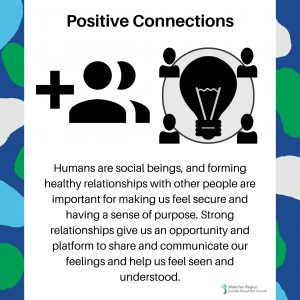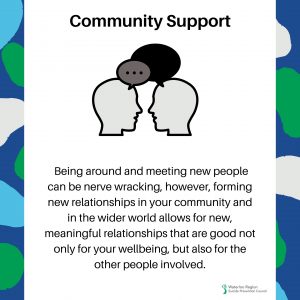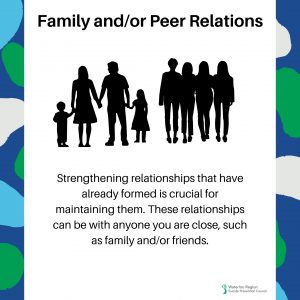This week in our Resilience & Protective Factors series, we are looking at Social Protective Factors. While last week’s psychological factors looked at internal factors, this week we are exploring the importance of social connections, community, and belonging. This week we will talk about positive connections, community support, and family and/or peer relationships as elements of positive mental health and wellbeing.
1: Positive Connections

Positive social connections include any people we have contact with, such as friends, co-workers, peers, mentors, teachers, coaches, or even acquaintances, with whom we have positive, healthy relationships. Humans are social beings, and forming healthy relationships with other people can bring feelings of security or a sense of belonging or purpose to our lives. Strong relationships give us an opportunity and platform to share and communicate our feelings and help us feel seen and understood. Forming and maintaining relationships, whether they are weak ties or strong relationships, can play a role in positive mental health and wellbeing.
2: Community Support

Beyond your close social circles, feeling like you belong in your wider community and broadening relationships or forming new connections with people that you didn’t know before is another great protective factor. Being around and meeting new people can be nerve wracking, however, forming new relationships in your community and in the wider world allows for new, meaningful relationships that are good not only for your wellbeing, but also for the other people involved. Volunteering at a local school, hospital or community groups, or joining an interest group is a great way to meet new people that have similar interests as you, which can ease initial hesitation to start a conversation with someone new. Many social opportunities such as volunteering and interest groups have become increasingly moved to virtual platforms.
3: Family and/or Peer Relationships

Close relationships and strong ties, such as those that might be felt for family or for one’s closest friends or supports, and important as these tend to be the relationships we are most impacted by. Some ways to strengthen and maintain these relationships could be through having an open line of communication and making time for people. Arranging a phone call, virtual dinner, or online games night could be some ways to boost your social connection with close ties, which can also boost your mood and strengthen these bonds which impact long-term mental wellbeing.
Local Community resources:
“Connect” is one of the Five Ways to Wellbeing developed by the Mental Wellness Network of Waterloo Region. Their website contains information and suggestions on how to use this way to wellbeing.
Self Help & Peer Support provides opportunities for individuals who experience mental health and/or addiction issues to build supportive connections with peers who have similar experiences. They offer a variety of group programs, currently being offered virtually, that can offer opportunities for connection while also supporting your recovery journey through facilitated programming.


